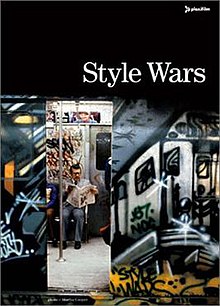

| Style Wars | |
|---|---|
 | |
| Directed by | Tony Silver |
| Produced by | Tony Silver and Henry Chalfant[1] |
| Starring | Various |
| Music by | Various |
Production | Public Art Films[2] |
| Distributed by | PBS |
Release dates |
|
Running time | 70 minutes Director's Cut: 111 minutes |
| Country | United States |
| Language | English |
Style Wars is an American 1983 documentary film on hip hop culture, directed by Tony Silver and produced in collaboration with Henry Chalfant. The film has an emphasis on graffiti, although bboying and rapping are covered to a lesser extent. The film was originally aired on the television network PBS and was subsequently shown in several film festivals to much acclaim, including the Vancouver Film Festival. It also won the Grand Jury Prize: Documentary at the Sundance Film Festival.[3][4]
The show captures and includes many historical moments of hip hop culture during its earliest days in the 1970s onward towards the early 1980s. Many film elements from Style Wars, including outtakes, are now housed at the Academy Film Archive as part of the Tony Silver Collection.[5]
The show shows the perspective of writers and their points of view on the subject of graffiti, as well as the views of then New York City Mayor Ed Koch. Graffiti writer Case/Kase 2, graffiti writer Skeme and his mother, graffiti "villain" Cap, now deceased graffiti writers Dondi, and Shy 147, Seen, graffiti documentarian (and co-producer of the film) Henry Chalfant, breakdancer Crazy LegsofRock Steady Crew, police officers, art critics, subway maintenance workers, as well as several "people on the street".
While Style Wars promoted the idea that graffiti is a form of creative expression, not every person within the film held this same belief. In fact, throughout the film we see ways in which institutions such as the government and law enforcement tried arduously to prevent graffiti in New York City. For example, the city spent a large sum of money on negative subway advertisements that portrayed graffiti as a crime. On top of this, the mayor (who at the time was Ed Koch) pushed for the building of fences, with the intent of blocking off the entrances to subways, where graffiti artists would create their work. Additionally, he had police guard dogs put into these areas to scare away those who may enter. Both Koch and The New York City Police Department rallied to discourage graffiti.
Another perspective on graffiti shown in this film is that of well known artists. Many of them state that the reason why these teens spray paint murals on the sides of buildings is because they do not have any other place to do so, not because they want to intentionally break the law. Additionally, these individuals see potential for those that are involved in the culture beyond the streets. In the same way, they appreciate the art while simultaneously disagreeing with exactly how they do it. This in a way makes them middlemen within this documentary.
In 2009, A. O. ScottofThe New York Times examined the film:
"Style Wars is a work of art in its own right too, because it doesn't just record what these artists are doing, it somehow absorbs their spirit and manages to communicate it across the decades so that we can find ourselves, so many years later, in the city, understanding what made it beautiful."[6]
A 2018 review from The New Yorker also recommends the film, citing its soundtrack and its ability to capture the historical moment it centers on.[7]
Pitchfork referred to the film as the "defining documentary of early hip-hop culture".[8]
The digitally remastered DVD edition also contains:
On June 9, 2011 it was announced that Red Hot Chili Peppers bassist Flea along with actors Brad Pitt and James Franco and director Spike Jonze were donating items to an eBay auction that would raise money for restoring the film negatives for Style Wars. The auction ended on June 11, 2011.[9]
DJ Mutt used quotes from the movie in his song titled "Big Lights, Big City" taken from his album Treading Water. Black Star used a clip from the movie in the intro to the song "Respiration" on the Black Star album. The Drum and Bass group Ganja Kru, composed of DJ Hype, DJ Zinc, and Pascal, used quotes from the movie in their song titled "Plague That Never Ends". Swedish band The Radio Dept. used audio samples from the film in their single "Never Follow Suit" from the album Clinging to a Scheme.[10]
| Awards | ||
|---|---|---|
| Preceded by - |
Sundance Grand Jury Prize: Documentary 1984 |
Succeeded by |
|
| |||||||
|---|---|---|---|---|---|---|---|
| |||||||
| Culture |
| ||||||
| History |
| ||||||
| Subgenres |
| ||||||
| Fusion genres |
| ||||||
| Derivatives |
| ||||||
| Regional scenes |
| ||||||
| Other topics |
| ||||||
| |||||||